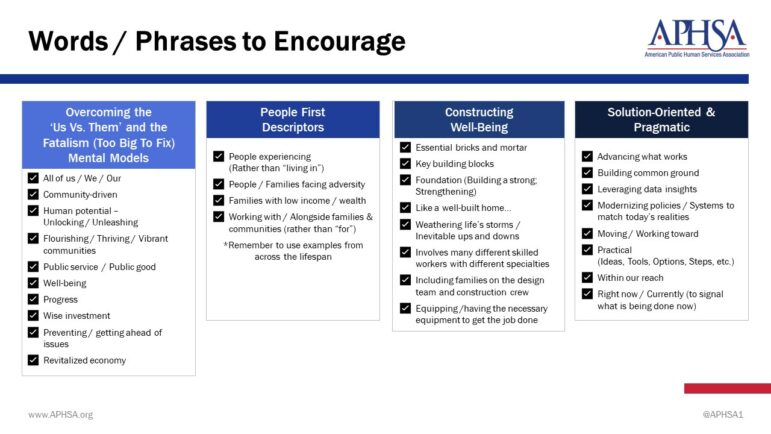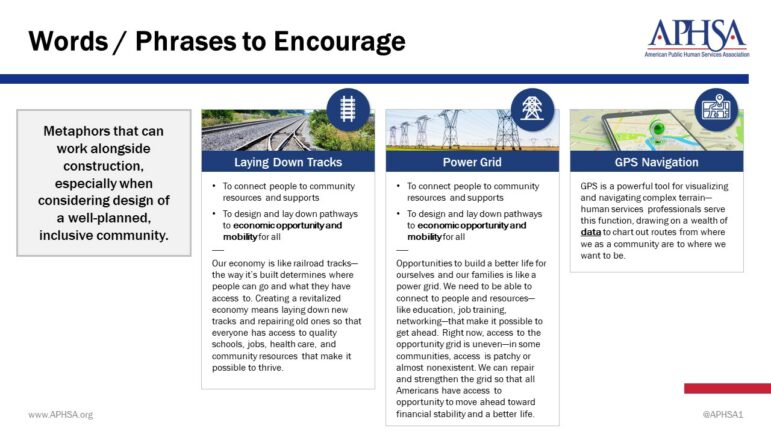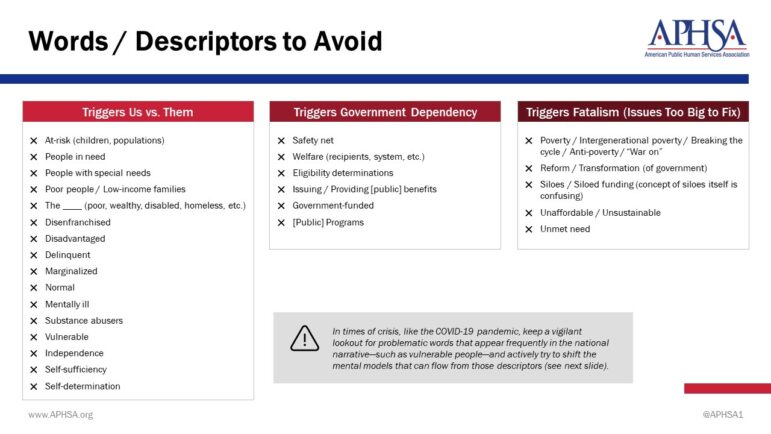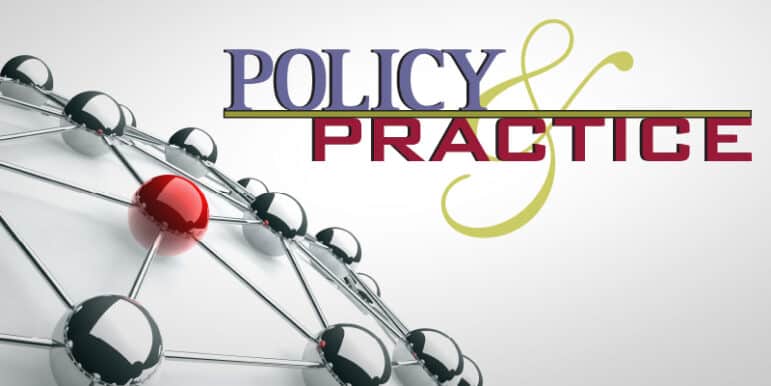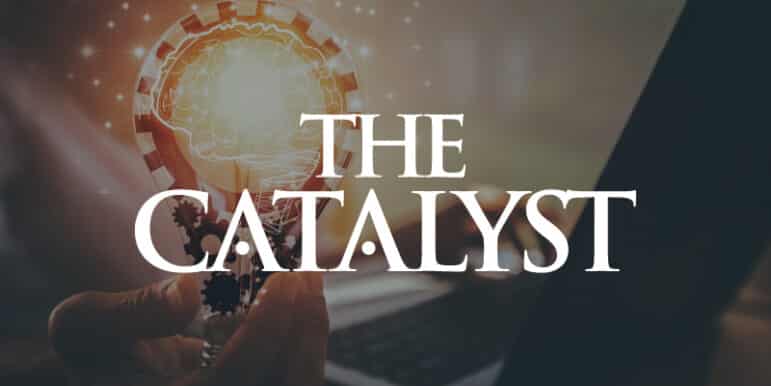Why Do We Focus on Narrative as Part of Our Strategic Work?
At APHSA, we use framing science and research to build common ground and drive our solutions. By understanding how our brains make meaning of communications that form our narratives—both productive and unproductive—we can better understand what we are up against as human services professionals working to drive more effective policy and practice solutions that advance well-being for all.
When we communicate an idea, we want to believe that we are speaking into a blank slate with someone who is not only listening to us, but fully receiving what we have to say. The reality, however, is that we are speaking into a “sorting device” that has been taking information in from childhood and constantly finding ways to process it. Over the course of our lives, we apply cultural or simplifying models that make it easier for us to think about incoming information and our minds have a whole set of pre-existing patterns of thinking. And in our culture, certain narratives are repeated over and over and become “shared narratives.” You can spot them in common expressions and stories that almost everyone knows and how those expressions translate into widely engrained values and beliefs.
Through narrative work and cognitive science, we are working to understand the dominant frames Americans use to reason about issues we care about, and then identify what frame elements might allow us to shift old beliefs and provide “thinking tools”—ways people can think more productively about issues, particularly those that involve understanding systems and structures.
VALUES WE AIM TO TRIGGER THROUGH NARRATIVE:
- Every person is born with the potential to build and live a good life (human potential)
- There are common sense solutions that we know work (pragmatism)
- It makes sense to prevent problems from getting worse and costing more by acting early on (prevention)
- Every American should have a chance to reach their full potential no matter where they’re born (fairness across places)
What Does a Productive Narrative Look Like for Human Services?
We share a common desire to be healthy and live well no matter where we come from or what our life experiences have been. Every one of us wants to live in a vibrant community where we feel safe and can be active, in a home that is stable and affordable, and in a place that gives us opportunities to support our loved ones through quality education and work.
There are certain fundamentals to building a vibrant community. Just like a house that can weather storms, a truly vibrant community has neighborhoods and places where everyone can live, learn, work, play, and connect – and provides access to services that help us through life’s inevitable ups and downs.
To help people stay healthy and live well, local health and human services organizations collaborate with community partners, combining resources and strengths to help provide opportunities for everyone to live well. Through innovation and focus on prevention and key supports, local health and human services organizations work with residents, schools, health care providers , judges and mayors, owners of small businesses and large corporations, law enforcement, neighborhood groups, librarians, parks and recreation staff, and more to build capacity in our communities and enhance well-being across the nation.
- Be aspirational and draw on a shared value
- Introduce the metaphor – using comparison phrases such as “just like a house” and words associated with the metaphor
- Further illustrate how it works by extending the metaphor
- Use phrases that are inclusive and help avoid the us vs. them mental model
Here’s a few productive narratives in action…
To become a nation where all Americans can thrive, together we must build resilient communities and a revitalized economy. We know our own well-being is inextricably linked to the health of the communities where we grow-up, go to school, gain skills for life, work, raise kids, and retire. When we focus on building well-being for everyone across the lifespan, we strengthen our nation as a whole.
Human services are the essential bricks and mortar that undergird what allows all of us an equitable opportunity to live our fullest lives. Human services help shape and support us at key points in our lives, opening opportunities for lifelong success. Human services provide foundational supports to families facing adversity and ensure resilience at familial and community levels that help us weather life’s inevitable ups and downs.
Why Do Human Services Matter?
The following video draws on language from our Cornerstone series and shows how human services serve as the building blocks of a stronger, more inclusive America.
APHSA’s National Council of Local Human Services Administrators Infographic
At the core, we know there are certain fundamentals to building a vibrant community. Just like a house that can weather storms, a truly vibrant community has neighborhoods and places where everyone can live, learn, work, play, and connect—and provides access to services and supports that help us through life’s inevitable ups and downs.
This infographic is a visual representation of what a thriving community looks like and the vital role local human services agencies play in creating thriving communities. It helps advance a productive narrative by highlighting the many ways human services touches all of us and enhances well-being across our nation.
APHSA’s Approach
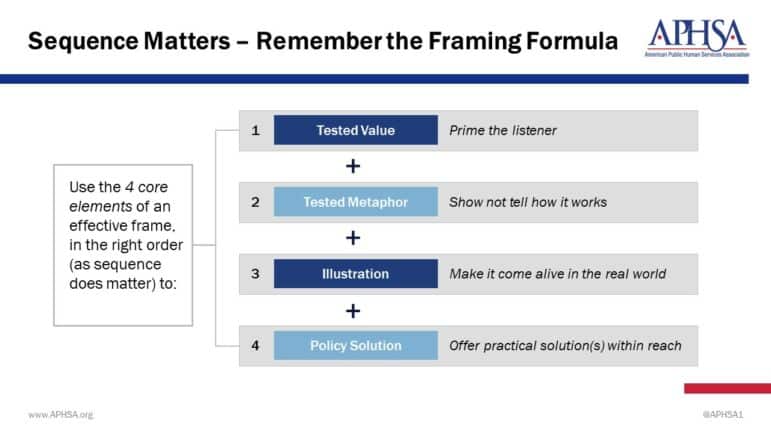
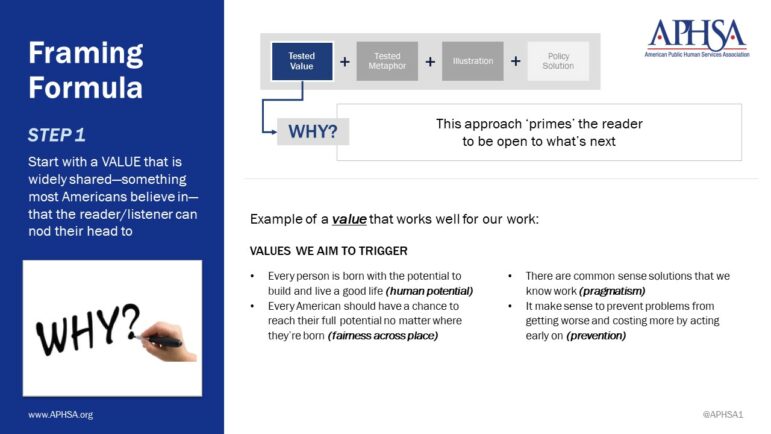
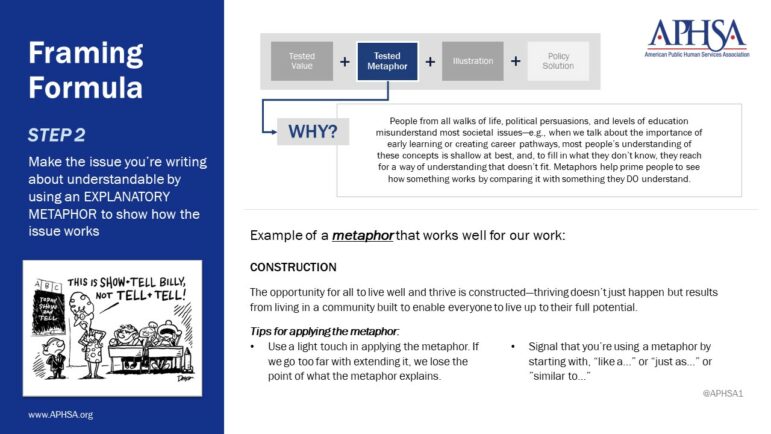
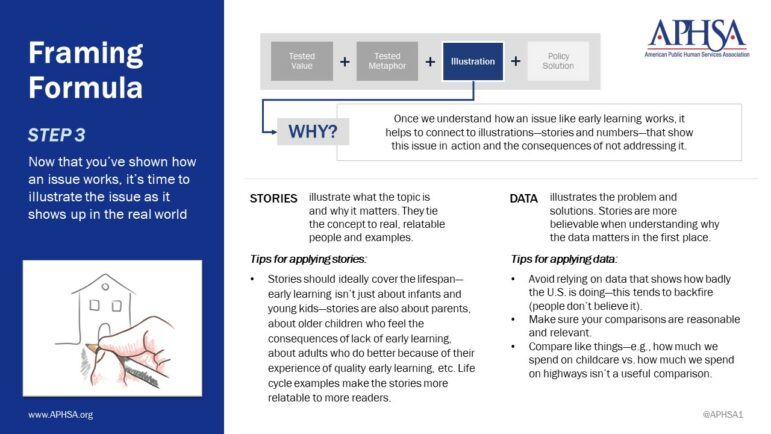
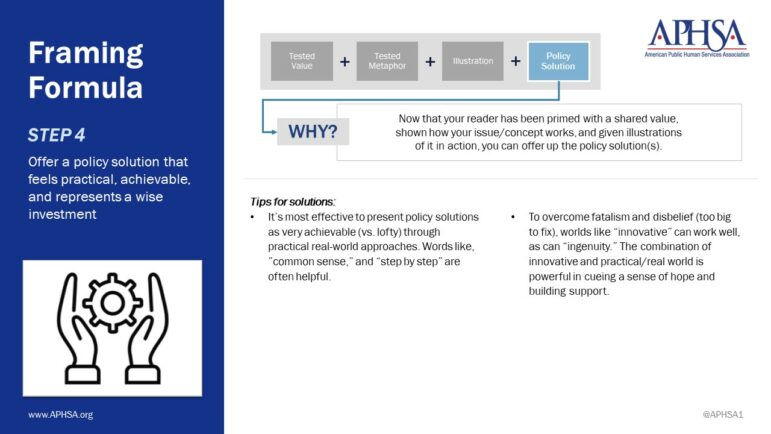
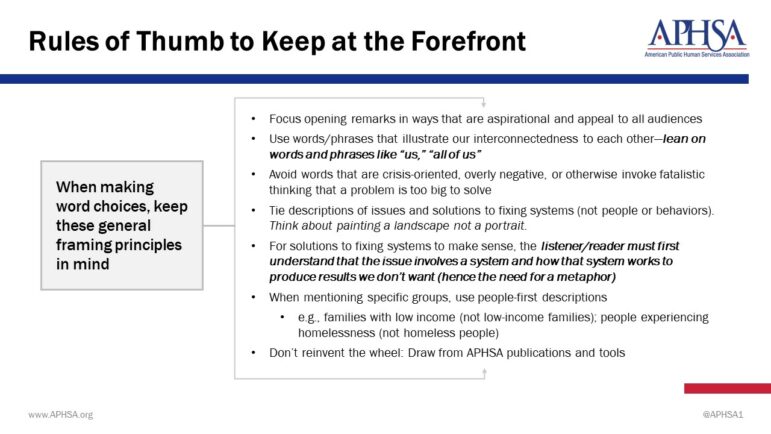
APHSA Resources & Publications
Primer on Productive Narratives
Join former APHSA President & CEO, Tracy Wareing Evans, for an overview on driving solutions through effective framing.
Policy & Practice: Articles Over the Years
Policy & Practice is APHSA’s long-standing, bi-monthly magazine providing coverage of the latest legislation, cutting-edge technology, and best practices proven in human services. Industry leaders from the public and private sector, as well as other thought leaders, contribute to each issue and provide insight on their latest challenges and success stories.
Why Framing Matters: Ways to Move Forward
By: Tracy Wareing Evans, April 2017
Why Framing Matters: A Review of the Basics
By: Tracy Wareing Evans, October 2016
The Catalyst: APHSA’s Blog
Our blog, The Catalyst, features content from members, partners, and staff, as well as experts from outside the human services sector focusing on what it takes to build well-being from the ground up. Our Productive National Narrative section focuses on promoting productive narratives that facilitate finding common ground and advancing solutions that are locally-adaptable and centered on the whole family.
Additional Resources & Exemplars
We are thankful for members, partners, and researchers who are sharing the journey to frame effectively in order to drive the policy solutions within our reach. While not an exhaustive list, please check out these exemplar organizations and resources.
Resource/Exemplar
Description
Nonprofit research organization that helps mission-driven organizations build public will for progressive change. Their recent report and webinar series focuses on Moving Mindsets
A hub for breakthrough ideas and collaborations that move children and their parents toward educational success and economic security. Their Framing Two-Generation Approaches to Supporting Families: Messaging Guide provides messages to make a strong case for 2Gen and suggestions for using compelling language to articulate the value of 2Gen in a way that resonates with the audience.
National Assembly’s National Reframing Human Services Initiative seeks to build broader and deeper public support for human services so that everyone has the opportunity to reach their full potential
Catalyzes durable narrative change in order to make equity and social justice common sense
Organizers and advocates, communications strategists and researchers, trainers and ad writers who are mobilizing their progressive base for racial justice, gender equality, and economic prosperity
Creating real-world solutions from cutting-edge mind science research to reduce discrimination and other harms linked to race, gender, and other identity differences
Multi-year initiative to bring financial health and prosperity to all in the United States
Washington State’s 10-year plan to dismantle poverty is a great example of productive narratives in action
Denver Human Services gives voice to the lives of those they touch and those that deliver their services with care, compassion, and commitment
Co-creates enduring change toward a just society
Shaping a South where all people thrive, MDC helps to frame a community agenda by identifying barriers community members face and strategies for moving forward
A growing community of government, neighborhood and nonprofit leaders, advocates and change agents coming together across fields, sectors, backgrounds, and geographies to work towards durable structural and community transformation grounded in wellbeing and equity.



